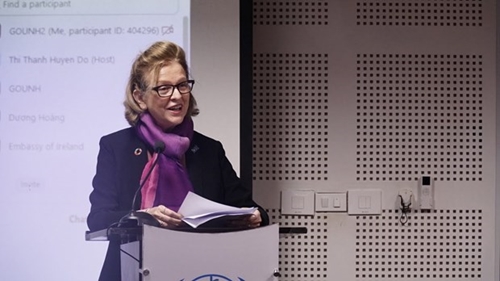The effort not only aims to get more women in elected positions, but also supports them to be effective when they get elected, she added.
    |
 |
|
UNDP Resident Representative Caitlin Wiesen. (Photo: UNDP) |
Wiesen made the pledge on February 4 while addressing the launch of the research findings of a study titled “Roles of Women Representatives in Vietnam’s Development during the 2016-2021 Term” held by the University of Social Sciences and Humanities (USSH) under Vietnam National University-Hanoi and the UNDP.
“Women’s equal representation in leadership and decision-making at all levels, in both public and private sectors, is essential for realising Vietnam’s socio-economic development vision and key to equitable development that leaves no one behind,” she said.
The study showed that during the 2016-2021 term, the NA has its first female chairperson and 26.7 percent female representation.
UNDP’s global Human Development Report 2020 ranked Vietnam 65th out of 162 countries and among the top one-third of countries globally for women’s share of seats in parliament.
The study provides empirical evidence of how women have contributed socially, economically and politically to the country’s progress over the past five years. This is an important foundation for society and voters to have stronger confidence in women candidates in the upcoming National Elections.
It also recommends creating favourable conditions for NA delegates of all genders to proactively engage with voters via all channels, making use of social networking channels; and giving women delegates equal representation in all fields by promoting gender parity in all committees of the legislative body.
There is no significant difference between women and men delegates in the amount of time they spend on performing their delegates’ roles and mandates nor in the response rates in handling petitions and proposals from voters during this term, the study found.
For her part, Deputy Head of Mission/Head of Development, the Embassy of Ireland Elisa Cavacece said that the Provincial Governance and Public Administration Performance Index (PAPI) has been a powerful tool for the Vietnamese Government to capture feedback on how policy and public services have been delivered and benefited its citizens.
The soft launch of the research findings is a useful platform for the Embassy of Ireland to support and engage, in order to promote gender equality and women’s empowerment, she added.
The study was carried out with funding from the Australian Government’s Department for Foreign Affairs and Trade (DFAT), the Irish Embassy Vietnam and UNDP Vietnam, through the Provincial Governance and PAPI research framework.
Source: VNA